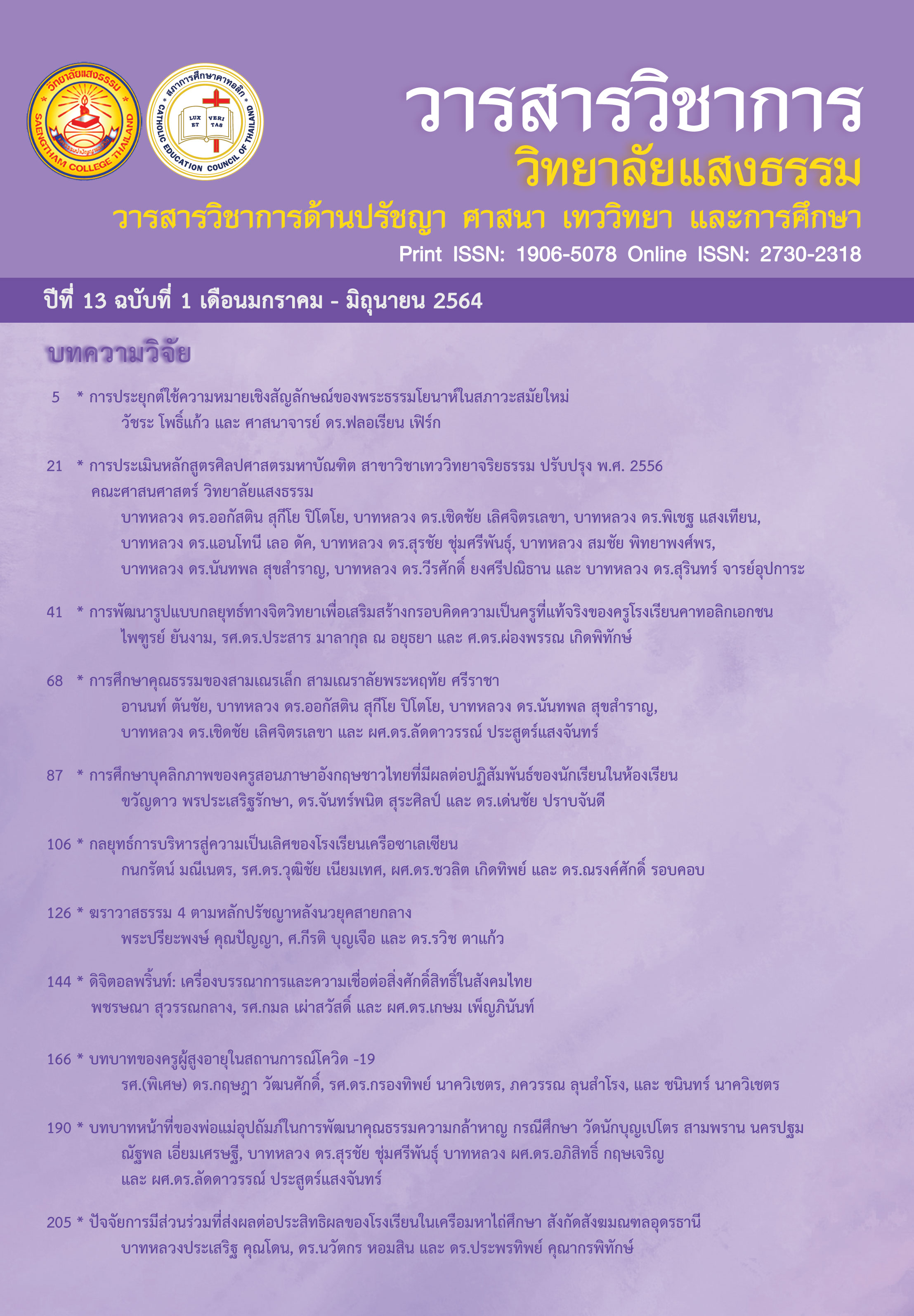Gharavasa-Dhamma 4 According to The Moderate Postmodern Philosophy.
Main Article Content
Abstract
Moderate Postmodern Philosophy aims to develop human potentiality based on the pursuit of knowledge that is sustainable, namely: Creativity, Adaptivity, Requisivity and Cooperativity to complement one's own quality of life and society, leading to true happiness according to reality. Gharavasa-Dhamma follows the Moderate Postmodern Philosophy, seeking the best part from each doctrine and then bringing it into practice. It can be compared to the four cardinal virtues of Aristotle which are the Qualities of Success in Life. The four Gharavasa Dhamma 1) focuses on controlling the subordinate instincts so that human beings may enjoy self-sufficiency and happiness, 2) focuses on creating, adapting, cooperating and pursuing, and so leading to the development of the quality of life for happiness even more, 3) controls the conduct in the middle way to improve the quality of life, 4) focuses on developing the real happiness on the happiness of others, a shared value in postmodern philosophy at the community and nation levels. The result shows the true value of Ghara-vasa Dhamma for educating all levels of people through teaching team and good training.
Article Details
- The academic and research articles, as well as the content and opinions expressed therein, published in Saengtham College Journal are solely the responsibility of the respective author(s).
- Articles published in Saengtham College Journal are the property of Saengtham College. Reproduction, modification, or dissemination of all or part of the content in any form without written permission from Saengtham College is prohibited.
- Articles published in Saengtham College Journal are protected under the Copyright Act.
References
กีรติ บุญเจือ. (2546). ชุดปรัชญาและศาสนาเซนต์จอห์น เล่มต้น เริ่มรู้จักปรัชญา. กรุงเทพฯ: มหาวิทยาลัยเซนต์จอห์น.
กีรติ บุญเจือ. (2546). ชุดปรัชญาและศาสนาเซนต์จอห์น เล่มสอง ย้อนอ่านปรัชญาโบราณของมนุษยชาติ. กรุงเทพฯ: มหาวิทยาลัยเซนต์จอห์น.
กีรติ บุญเจือ. (2546). ชุดปรัชญาและศาสนาเซนต์จอห์น เล่มห้า ย้อมอ่านปรัชญากังขาของมนุษยชาติ (ช่วงวิจารณ์ระบบเครือข่าย). กรุงเทพฯ: มหาวิทยาลัยเซนต์จอห์น.
กีรติ บุญเจือ. (2545). ปรัชญาหลังนวยุค แนวคิดเพื่อการศึกษาแผนใหม่. กรุงเทพฯ: ดวงกมล.
กีรติ บุญเจือ. (2522). ชุดปัญหาปรัชญา ปรัชญาลัทธิอัตถิภาวนิยม. กรุงเทพฯ: ไทยวัฒนาพาณิช.
กีรติ บุญเจือ. (2549). อรรถปริวรรตคู่เวรคู่กรรมปรัชญาหลังนวยุค. กรุงเทพฯ: โรงพิมพ์แห่งจุฬาลงกรณ์มหาวิทยาลัย.
กีรติ บุญเจือ. (2546). ชุดเซนต์จอห์นสอนปรัชญาภาษาง่าย เล่มต้น ปรัชญาประสาชาวบ้าน พ.ศ.2546. กรุงเทพฯ: สำนักพิมพ์แผนกพิมพ์และผลิตเอกสาร มหาวิทยาลัยเซนต์จอห์น.
พุทธทาสภิกษุ. (2513). ฆราวาสธรรม อบรมพระนิสิตฯ บวชภาคฤดูร้อน พ.ศ.2513. กรุงเทพฯ: สำนักพิมพ์สุขภาพใจ.
พระมหาจู่ล้อม ชูเลื่อน. (2546). ความกล้าหาญทางจริยธรรมในการบำเพ็ญบารมีของพระโพธิสัตว์ในทศชาติชาดก. วิทยานิพนธ์ศิลปศาสตร์มหาบัณฑิต, สาขาวิชาจริยศาสตร์ศึกษา บัณฑิตวิทยาลัย มหาวิทยาลัยมหิดล.
พระธรรมปิฏก (ป.อ. ปยุตฺโต ). พจนานุกรมพุทธศาสตร์. ฉบับประมวลธรรม. พิมพ์ครั้งที่ 7 พ.ศ. 2535, พิมพ์ครั้งที่ 12 พ.ศ. 2546. S.I.215; Sn.189.สํ.ส. 15/845/316; ขุ.สุ. 25/311/361.
พุทธทาส. (2513). ฆราวาสธรรม. กรุงเทพฯ: สำนักพิมพ์สุขภาพใจ.
พระสมทบ ถิรปญฺโญ (รุ่งมิตรจรัสแสง). (2554). ภาวะผู้นำของเยาวชนตามหลักฆราวาสธรรม 4: กรณีศึกษาโรงเรียนหล่มสักวิทยาคม จังหวัดเพชรบูรณ์. วิทยานิพนธ์พุทธศาสตรมหาบัณฑิต สาขาวิชารัฐประศาสนศาสตร์, มหาวิทยาลัยมหาจุฬาลงกรณราชวิทยาลัย.
ถาวร เสาร์ศรีจันทร์. (2547). เอกสารคำสอนรายวิชา หลักและวิธีการสอนจริยศึกษาระดับประถมศึกษา. เชียงใหม่: มหาวิทยาลัยมหาจุฬาลงกรณราชวิทยาลัย วิทยาเขตเชียงใหม่.
ประไพ ฉลาดคิด. (2548). หลักการสอน Education: Mathematics Education. คณะครุศาสตร์ มหาวิทยาลัยราชภัฏสวนสุนันทา.
สมพงษ์ จิตระดับ. (2530). การสอนจริยศึกษาในระดับประถมศึกษา. กรุงเทพฯ: สำนักพิมพ์โอเดียนสโตร์.
Borchert, Donald. (2006). Encyclopedia of Philosophy. New York: Macmillan.
Craig, Edward. (1998). Routledge Encyclopedia of Philosophy. London: Routledge.
Sim, Stuart. ed. (2001). The Routledge Companion to Postmodernism. London and New York: Routledge.
Taylor, Victor. ed. (2001). Encyclopedia of Postmodernism. London and New York.


